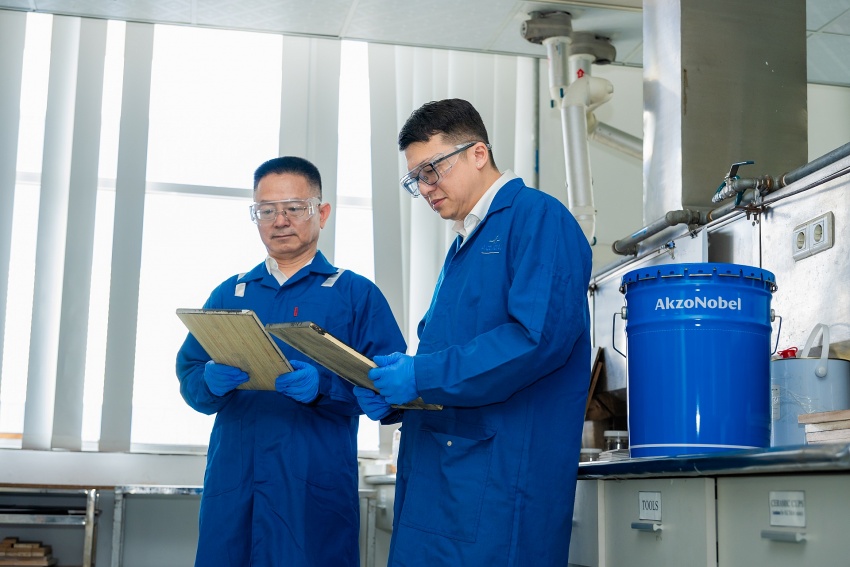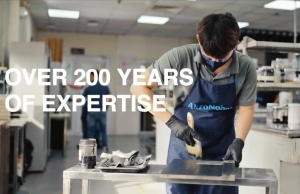AkzoNobel advances sustainable innovation in the furniture market
 |
| Leonard Leow (left side), R&D manager of Wood Finishes SEA, and Denis Wang, technical manager of Wood Finishes APAC at AkzoNobel |
Sustainability is at the core of AkzoNobel's identity. Could you shed some light on how AkzoNobel incorporates sustainability across its operations?
Wang: Sustainability is one of the core values of AkzoNobel. It drives our company purpose, Paint the Future, and guides our long-term vision. We’ve set ambitious targets for 2030, including 50 percent less carbon emissions in our operations and across our value chain (using 2018 as the baseline), 75 per cent of suppliers to meet sustainability expectations as assessed by EcoVadis in 2030 and 100 per cent circular use of materials in our own operations driven by reduce, reuse and recycle.
Furthermore, we are committed to becoming carbon neutral by 2050. Our mission also extends to helping customers lower their energy use and create high-quality products with minimal carbon footprints and emissions.
What sustainability initiatives has AkzoNobel implemented in Vietnam?
Leow: We are committed to reducing carbon emissions and minimising our carbon footprint, which is why energy-saving measures have been implemented across all our manufacturing facilities.
Each of our factories is actively optimising resource use to reduce environmental impact throughout both production and operational processes.
A key pillar of our strategy is developing more sustainable products. We're investing in technologies with a reduced environmental impact, such as water-based solutions with low levels of volatile organic compounds (VOCs).
In Vietnam, our latest sustainability initiative centre on the advancement of ultraviolet (UV)-cured coatings, which contain little to no VOCs. For kitchen cabinets, we apply UV coatings to the underside and complete the process with a UV top coat, representing a significant step toward a lower carbon footprint solution.
How do you view the potential of Vietnam-based furniture manufacturers within the global supply chain, and in what ways is AkzoNobel supporting their growth and competitiveness?
Wang: AkzoNobel is a leading supplier to the wood furniture industry, recognised for its commitment to innovation and sustainability. We have developed a wide range of more sustainable products, including water-based coatings and UV-curable finishes, which support our customers in meeting their own sustainability goals and reducing environmental impact.
The kitchen cabinet segment is one of the emerging segments for AkzoNobel within the wood coatings industry, particularly in Vietnam. We have partnered with customers to supply high-quality, more sustainable coating products, such as water-based coatings and formulations free from formaldehyde.
Our product range for the kitchen cabinet industry is designed to meet essential performance requirements, including stain and scratch resistance. In addition, we are actively promoting other more sustainable technologies, including bio-based solutions, as part of our ongoing commitment to reduce our value chain’s carbon footprint. Currently, our more sustainable coating solutions are primarily used by several esteemed customers within the furniture segment.
However, we have strategic plans to expand into additional segments, broadening our reach and further contributing to sustainable practices across the wood industry. At this stage, our coatings can contain up to 15 per cent using biobased material in the production without reducing its performance, contributing to the principles of a circular economy. We are committed to advancing this further, with an ambitious goal of achieving 50 per cent bio-based content in close collaboration with our strategic customers and partners.
What are some key trends shaping the global wood finishes market, especially within segments like kitchen cabinets, in relation to sustainability, performance, and design?
Wang: Furniture and kitchen cabinets share similar design values, particularly in terms of nature and colour. Customers today seek natural beauty, especially the unique grain of high-quality wood. Our clear coatings enhance this natural aesthetic, increasing the value of the finished product.
To meet diverse design requirements, we also offer a broad range of pigmented coatings, including custom colours and special effect finishes such as metallics.
Beyond aesthetics, our coatings are engineered for durability, providing protection against sunlight, moisture, and humidity to ensure lasting performance and appearance, even in demanding environments.
How do Vietnam-based furniture manufacturers benefit from AkzoNobel's coating solutions in terms of product quality, production efficiency, and meeting global sustainability requirements?
Leow: Our fully established factory in Vietnam ensures consistent and high-quality production, batch after batch. Additionally, our advanced UV fast-curing technology enables furniture and cabinet manufacturers to streamline their workflows and enhance overall efficiency.
Additionally, AkzoNobel has strong ties with the Kitchen Cabinet Manufacturers Association (KCMA) in the United States. Our local team is well-versed in KCMA standards, which is a key benefit for customers targeting export markets. We support them with colour matching, product trials, and the full process of preparing goods for shipment to the US, helping ensure compliance and success overseas.
AkzoNobel is set up to introduce new coating products tailored to meet market requirements, using water-based, bio-based, and UV curing technologies. Could you share more details on how AkzoNobel conducts this objective and how these technologies support both performance and sustainability goals?
Wang: AkzoNobel offers a comprehensive product portfolio for kitchen cabinets and furniture, with a focus on durability and sustainability. Our products stand out for their low emissions, almost zero in terms of multi-heating emissions, making them cleaner than many conventional alternatives.
In addition, we offer one- and two-component water-based polyurethane (PU) coatings. Although water-based coatings are still in the nascent stages of adoption in Southeast Asia, we collaborate closely with our US and European research and development (R&D) teams to continuously enhance product performance.
In some areas, such as scratch and wear resistance, our water-based solutions now rival or even outperform traditional PU coatings.
Our UV-cured coatings are also designed to support high productivity, particularly when applied through automated production lines. In Vietnam, an increasing number of manufacturers are adopting UV coatings for sealers, primers, and topcoats. To further enhance efficiency and sustainability, we recommend energy-saving practices such as utilising automatic sprayers with AC topcoats and transitioning to product technologies based on UV, LED, water-based.
On the innovation front, we’re introducing new technologies like Energy Efficiency in Buildings to boost coating performance. In line with our sustainability goals, we partner with suppliers to lower the carbon footprint across the value chain through innovative water-based and UV-curable formulations.
Every product is designed with carbon content in mind, using carbon footprint calculators and data from our global R&D network. Our aim is to assist customers in minimising their carbon footprint throughout the value chain by utilising our carbon footprint calculator for finishes in the furniture and cabinets market.
How does AkzoNobel’s investment in R&D and innovation contribute to delivering sustainable and high-performance coating solutions, especially in markets like Vietnam?
Leow: Our R&D is focused on developing the next generation of sustainable products, those with low VOC emissions and fast-curing technologies like UV coatings. Our objective is to make these innovations faster, more cost-effective, and user-friendly for manufacturers.
We’re currently running multiple projects across the globe, including developments in the next generation of water-based systems, UV primers, and UV enamels. These innovations expand our business potential and support our customers, especially important now as tariffs and market pressure increase the need for cost-efficient solutions.
To strengthen our capabilities, we collaborate with labs in Vietnam, China, and Sweden, holding regular meetings and conducting formula transfers to ensure alignment and the consistent delivery of high-performance, market-relevant products.
 |
What potential effects do you anticipate the current US tariff policies will have on furniture and cabinet exports?
Wang: Vietnam is in a unique position with strong ties to both the US and China. Ongoing negotiations between Vietnam and the US may lead to improved tariff terms. While short-term challenges exist, the long-term outlook is positive as more manufacturers move to Vietnam, benefiting from its proximity to China and strong supply chain advantages.
AkzoNobel sees Vietnam as a strategic market, especially in the furniture and kitchen cabinet segment. Despite tariff pressure, we're committed to investing in product development, reducing raw material costs, and boosting competitiveness. As a global company, we can adapt to shifting trade dynamics. If tariffs are lowered in the future, the impact on our operations and customers will be much less significant.
 | AkzoNobel's investment for sustainable growth in South Asia-Pacific Earlier this month, AkzoNobel inaugurated new production facilities at its Bac Ninh site to bolster its leading position and enhance sustainable manufacturing in the region. Jeff Jirak, managing director of AkzoNobel's Powder Coatings business, and Şirvan Canıtez, regional commercial director of Powder Coatings in South Asia-Pacific, talked to VIR's Linh Le about the company's strategic plans and sustainable works. |
 | AkzoNobel Wood Finishes at the forefront of quality and sustainability in furniture industry AkzoNobel's Wood Finishes Division is at the forefront of transforming Vietnam's wood and furniture industry towards sustainability with its high-quality products and innovative solutions. |
 | Rosy outlook for kitchen cabinet firms Exports of Vietnam's wood products reached $7 billion in the first eight months of 2024, up 21.5 per cent on-year. Gregoire Mercie, regional commercial director at Wood Finishes & Adhesives at AkzoNobel Asia, speaks to VIR's Thanh Van bout the innovation and creativity needed by Vietnamese firms to sustain their competitive edge. |
What the stars mean:
★ Poor ★ ★ Promising ★★★ Good ★★★★ Very good ★★★★★ Exceptional
Related Contents
Latest News
More News
- Meta VP discusses AI’s role in Vietnam’s digital economy (May 13, 2025 | 09:07)
- CEO opinions on unexpected reciprocal US tariffs (April 07, 2025 | 10:14)
- Vietnamese Party chief holds phone talks with US President (April 05, 2025 | 19:46)
- Vietnam-Singapore: a model for economic integration (April 02, 2025 | 16:08)
- Singapore continues real estate expansion (April 02, 2025 | 16:03)
- Sembcorp remains a principal driver of Singapore relationship (April 02, 2025 | 15:15)
- Strengthening partnership to unlock genomic potential in Vietnam (March 27, 2025 | 15:21)
- Flexible policies attractive to South Korean groups (March 27, 2025 | 14:44)
- Singaporean PM’s visit to Vietnam to strengthen comprehensive strategic partnership (March 25, 2025 | 14:40)
- Vietnam still primary investing beneficiary (February 28, 2025 | 10:51)


 Tag:
Tag:














 Mobile Version
Mobile Version